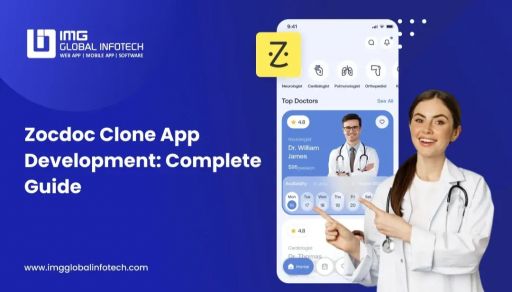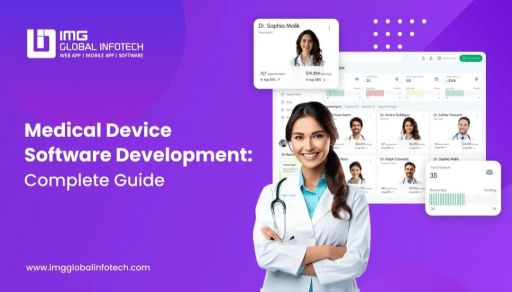AI In Transportation: Benefits And Challenges
Lokesh Saini
Jun 30, 2025

Artificial Intelligence (AI) is quickly impacting each element of our lives, and the transportation industry is one of those elements. Self-driving vehicles, which have been engineered to understand complex scenarios in a highly dynamic environment like the city, to the smartest of systems coordinating global supply chains, AI is preparing to change the way we move consumers and goods.
We can envision a future in which we can move safely, efficiently, and in the most sustainable way possible. Moving forward, AI will be extremely beneficial, but with this advancement comes risks and challenges, such as ethical concerns, data privacy, and costly capital expenditures that companion infrastructure needed to integrate AI into transport as smart mobility continues to evolve.
In this blog, we will discuss AI in Transportation and how it holds much promise but can present big problems for the transportation sector and the future of mobility, too.
What Is AI in Transportation Work?
The application of artificial intelligence in transportation involves a number of different AI areas and can employ a variety of technologies, such as machine learning, computer vision, and analytics. AI in transportation intends to improve mobility on the basis of safety, efficiency, and sustainability. Potential implementations include autonomous vehicles, intelligent traffic management systems that manage the flow and reduce congestion, predictive maintenance of vehicle fleets, and planning efficient routes for logistics (to name a few).
Benefits of AI in Transportation
Artificial Intelligence (AI) changes how transportation operates, improving speed, safety, and efficiency. Of course, there are many advantages:
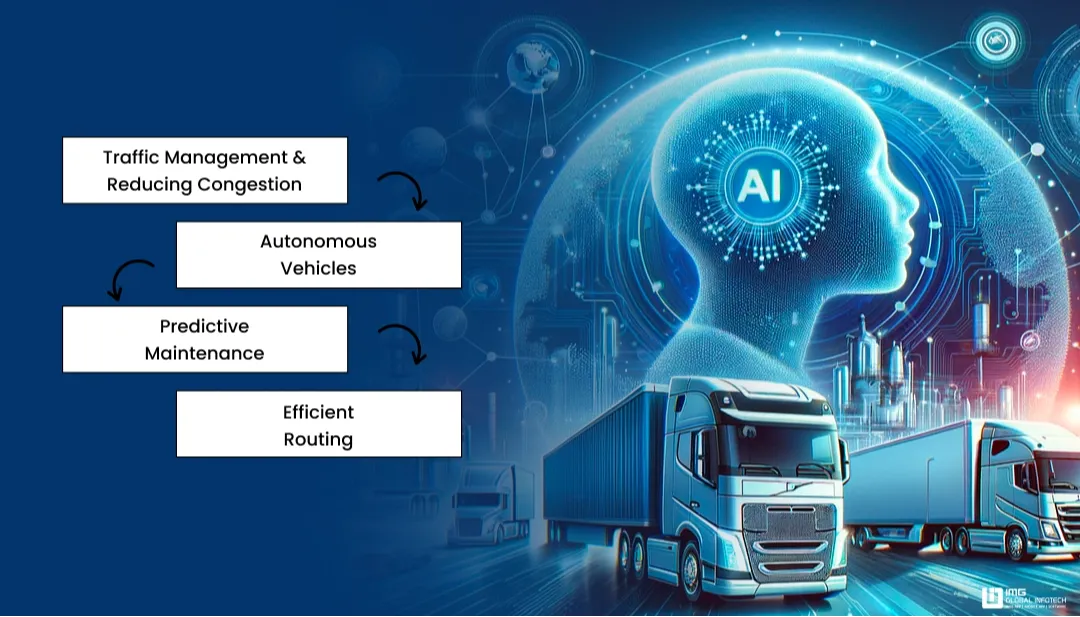
Traffic Management & Reducing Congestion
AI-enabled systems can track real-time traffic congestion by communicating with surrounding road infrastructure and adjusting traffic light timings according to optimized patterns. A reduction in travel time and delays will help improve urban mobility, particularly in smart cities. If you want to invest in transportation with AI, you must hire developers and know affordable AI App development costs.
Autonomous Vehicles
AI is the foundation for self-driving vehicles, which is critical to their ability to avoid traffic collisions. An autonomous vehicle can use AI systems to detect other vehicles, find lane markings, and evaluate all data that help them make fast decisions necessary to avoid accidents. Self-driving vehicles will help to improve the safety of road users, and research suggests that removing human-operated vehicles from roads could remove almost 90% of collisions seen today.
Predictive Maintenance
AI-enabled systems allow operators to monitor vehicle conditions and prescribe fault locations before faults develop into serious failures that could lead to breakdowns. The role of AI in transportation reduces vehicle downtime, reduces operational costs, and reduces vehicle depreciation through their useful life cycle in logistics and passengers' public transport systems.
Efficient Routing
AI solutions and supporting algorithms can process large sets of data quickly to calculate and prioritize the quickest routes. Professional transportation software consultancy can help implement these AI-powered routing systems effectively. If all relevant data was included, which interrelates traffic, weather, and road closures and construction or openings (which enabled the quickest routes), drivers could potentially save on fuel costs, reduce travel times, and decrease operating costs.
Applications of AI in transportation
Artificial Intelligence (AI) is transforming into a global opportunity, where every transportation system is being transformed, and new patterns emerge in how we move people and goods. AI is enabling autonomous driving or intelligent transport systems through efficiency, safety, and sustainability. The following are 10 key applications of the role of AI within the transportation sector:
1. Autonomous Vehicles (self-driving cars)
Self-driving cars are arguably the most disruptive AI-enabled application for transportation. A self-driving car can use an AI algorithm, along with sensors, LiDAR, cameras (and any other platforms), to detect its environment and make on-the-fly decisions. Leading companies in autonomous driving (Tesla, Waymo, Uber, etc.) are developing (and deploying) AI-enabled transportation systems that will be more functional in regard to vehicle navigation, object detection, lane positioning, and pedestrian safety.
2. Predictive Maintenance
AI can analyze data from in-vehicle sensors to spot potential faults before the fault occurs. Predictive maintenance refers to maintaining devices through real-time monitoring, which can help reduce downtime, reduce costs of repairs or servicing, and prolong vehicle life. Logistics firms and fleet operators are harnessing AI to develop engine-related issues and tire wear and foresee mechanical issues to avoid future operational stoppages.
3. Traffic Management and Optimization
AI-powered traffic management systems identify and make real-time traffic congestion analysis utilizing real-time traffic data recorded by sensors and cameras coupled with GPS data. Taxi app development can help eliminate unnecessary stops at traffic signals to improve traffic congestion along the route. By using operational data, smart cities can use AI in transport logistics to aggregate information to predict peak hours to better manage traffic and improve the efficiency of logistics operations, all of which reduce emissions and commute times.
4. Intelligent Route Planning and Navigation
Intelligent route planning powered by AI provides logistics efficiencies to transportation applications such as Google Maps and Waze by analyzing a wide range of data, such as weather, road closures, construction, and traffic disruptions, as well as past road use, to provide the optimized route. AI in public transportation technology enables the real-time configuration of an optimized route as conditions change and enables users to save travel time and fuel consumption.
5. Driver Behavior Monitoring
AI-based monitoring systems in the form of sensors in camera systems are being utilized, both in commercial fleets and public transportation, to continuously monitor driver behavior, decisions, and actions. The camera systems can monitor for decisions and actions that are detrimental to safety, such as fatigue, falling asleep, excessive use of a mobile phone, distracted driving, or reckless driving. The AI applications in transportation will alert both the driver and fleet managers, contributing to road safety and compliance with driving standards.
6. Artificial Intelligence in Public Transport Systems
Public transport systems utilize AI to assess passenger traffic and optimize schedules based on expected demand, including real-time fleet management. The use of AI in transportation utilizes groundswell passenger data to determine the best times for service and route efficiency, helping to maximize useful travel and service availability. Transit agencies also incorporate AI into crowd control, ticketing automation, and real-time service updates, creating a positive passenger experience.
7. Automated Toll Collection and Smart Parking
Artificial intelligence in the transportation industry enhances toll collection with vehicle recognition and RFID technology, which improves traffic conditions and alleviates congestion at toll plazas. Smart parking technology utilizes AI to detect vacant parking spots, guiding vehicles to these spots and being able to pay for contactless parking. The two positions both alleviate driver frustration and help cities manage traffic better.
8. Accident Detection and Prevention
Artificial Intelligence processes and analyzes real-time data from vehicle sensors, roadside infrastructures, and surveillance cameras, instantly detecting accidents. The system then notifies emergency services and can even be used for preventative measures. Uses of AI in transportation can provide historical crash data and identify at-risk areas in order to suggest changes in order to prevent future collisions.
Real-World AI in Transportation Examples
These are some examples of AI in transportation examples that are already revolutionizing transportation systems across the globe. Here are some excellent ai in transportation examples of AI already transforming the industry quite significantly:

1. Waymo - Autonomous Driving.
Waymo, a subsidiary of Alphabet, has launched a fully autonomous taxi service in Phoenix, Arizona. With absolutely no human intervention, Waymo vehicles, deployed throughout hundreds of thousands of miles, are now physically and mentally navigating complex environments, detecting pedestrians, and making real-time driving decisions.
2. Tesla - Autopilot and Full Self-Driving (FSD)
Tesla vehicle manufacturer's AI-powered Autopilot features are hugely popular and have allowed their vehicles to independently assist drivers with lane-keeping, adaptive cruise control, and automatic lane changes (to name a few). Their Full self-driving (FSD) uses neural networks to build a picture of the real world by decoding signals from their radars, cameras, and ultrasonic sensors, detecting objects, and then making driving decisions with very minimal human input.
3. Uber – AI Route Optimization
This is one of the best examples of AI in transportation examples. Uber uses artificial intelligence to forecast demand for ride-hailing, determine dynamic pricing, and recommend optimal routes for its drivers. By identifying traffic patterns and rider behavior, these algorithms minimize passenger wait times and increase driver efficiency.
4. London Underground – Predictive Maintenance
Transport for London (TfL) uses artificial intelligence to monitor the condition of train components in real time and detect potentially failure-causing problems before they can lead to breakdowns. Predictive maintenance boosts reliability by minimizing service disruptions while extending asset life.
5. NVIDIA – AI for Smart Cities
NVIDIA's AI platforms are used in traffic management systems, helping to detect and control congestion, monitor safety, and enhance safety exposure for autonomous vehicles. Cities like San Jose and Las Valo of AI core-placed machine learning traffic management systems from NVIDIA power and safety automobile urban-based data and mobility.
The Future of AI In Transportation
Ai helping in transportation is set to remake drastic advantages to transportation in the years to come. With these rapidly changing areas of infrastructure, machine learning, and computer vision, along with analytics, some of the trends that result feature for-scape recent across age and variable transportation functionality, and as old transportation or are continuously developing.
1. Widespread Adoption of Autonomous Vehicles
As an application of AI in transportation, self-driving cars, trucks, and delivery robots will increasingly populate our world. With improved object detection, adequate predictive decision-making, and vehicle-to-everything (V2X) communication, it will be possible to offer safe, streamlined autonomous mobility in both urban and rural environments.
2. Hyper-Personalized Mobility Services
AI will allow transportation experiences to be customized for each individual user. Ride-sharing apps, for example, will deploy AI in transportation and logistics to understand and track user preferences, offer suggested optimized routes, and provide customized travel options in real time for a personalized experience. Public transportation, in particular, could simultaneously deploy AI and crowd-sourcing to understand individual user routes and make real-time suggestions or recommendations.
3. AI-Centric Smart Traffic Systems
Cities will use the future of AI in transportation to dynamically manage traffic systems. Drawing on data from road sensors, cameras, and connected vehicles, AI systems will manage congestion based on alluring inducing data in real-time, decreasing congestion, reducing emissions, and improving response time by emergency services.
4. AI with 5G and IoT
The combination of AI and 5G IoT will absolutely revolutionize transportation. The impact of AI in transportation will enable data-driven, instantaneous communication between vehicles and associated infrastructure to allow real-time computing analytics, facilitate decision-making processes faster, and ensure travel is safer and more accurate.
5. Predictive Infrastructure Management
AI will enable users to forecast infrastructure wear and tear, such as bridge fatigue or if the road is damaged or has deficiencies long before the system fails. You can build AI chatbots with these insights. Governments and transportation authorities will use such information to respond faster to critical infrastructure failures and ultimate disasters, allocate repair budgets more wisely, and prioritize infrastructure repairs appropriately.
Challenges and Limitations
Artificial intelligence in transportation is advancing the transportation sector, but there continue to be challenges and shortcomings that impact its practicality for more widespread adoption. Understanding these obstacles is crucial for ensuring safety and reliability.
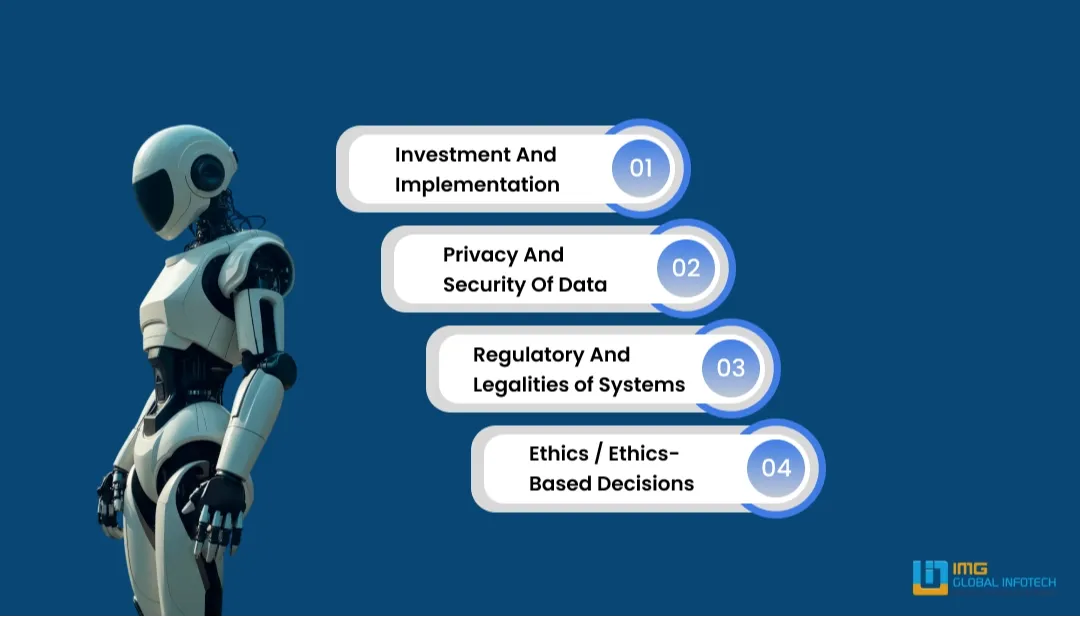
1. Investment And Implementation
AI-powered autonomous vehicles or smart systems require substantial investment in design and development as well as both software and hardware construction, to say nothing of the infrastructure needed for AI systems to function optimally. This provides a challenge for small enterprises or governments in developing regions where the price per unit can exceed that of a commuter rail.
2. Privacy And Security Of Data
Artificial intelligence in transportation technologies like smart traffic management systems necessitates collecting massive amounts of data from users or traffic mapping; therefore, privacy risk is not the only issue – data protection poses its own set of challenges, too. Enhanced vehicle connectivity offers greater convenience along with increased risks. Connecting with AI software development companies will help you conquer all of these difficulties.
3. Regulatory And Legalities of Systems
The legal aspects related to AI in the transportation sector are still developing. The global regulatory landscape for testing and deploying autonomous vehicles is quite sparse. There are no international frameworks addressing liability rules for accidents caused by self-driving cars, and formal regulations about this technology are lacking in many jurisdictions.
4. Ethics / Ethics-Based Decisions
Only AI has the capacity to make time-constrained decisions concerning life-and-death choices during accidents, such as who gets saved and who does not. There is serious concern from developers and regulators alike regarding how autonomous vehicles will approach potential collisions with ethics-based decision-making remotely or even without ethical probing.
Final Thoughts!
The impact of technology on enhancing safety, efficiency, and sustainability all revolve around reshaping transportation under promises made by autonomous vehicles in circulation and optimized logistics systems alongside intelligent traffic management systems. To further embrace that future, IMG Global Infotech stands ready at striking cores to develop custom AI solutions for logistics, including automation of warehouse functions, smart inventory systems, predictive fleet tracking, multilevel route optimization alongside advanced fleet tracking support, helping your business transport operations navigate complexities towards building smarter more connected tomorrow be part with AI App development company like ours.
-
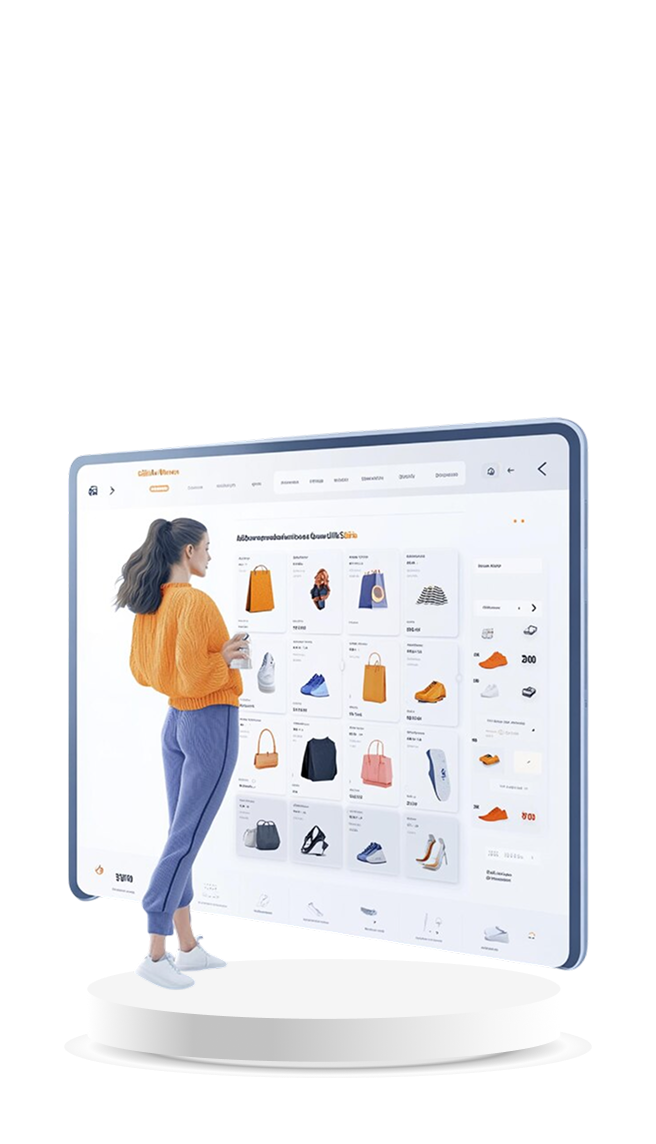 D2C Ecommerce Website: Complete Development Guide for Startups
D2C Ecommerce Website: Complete Development Guide for Startups
-
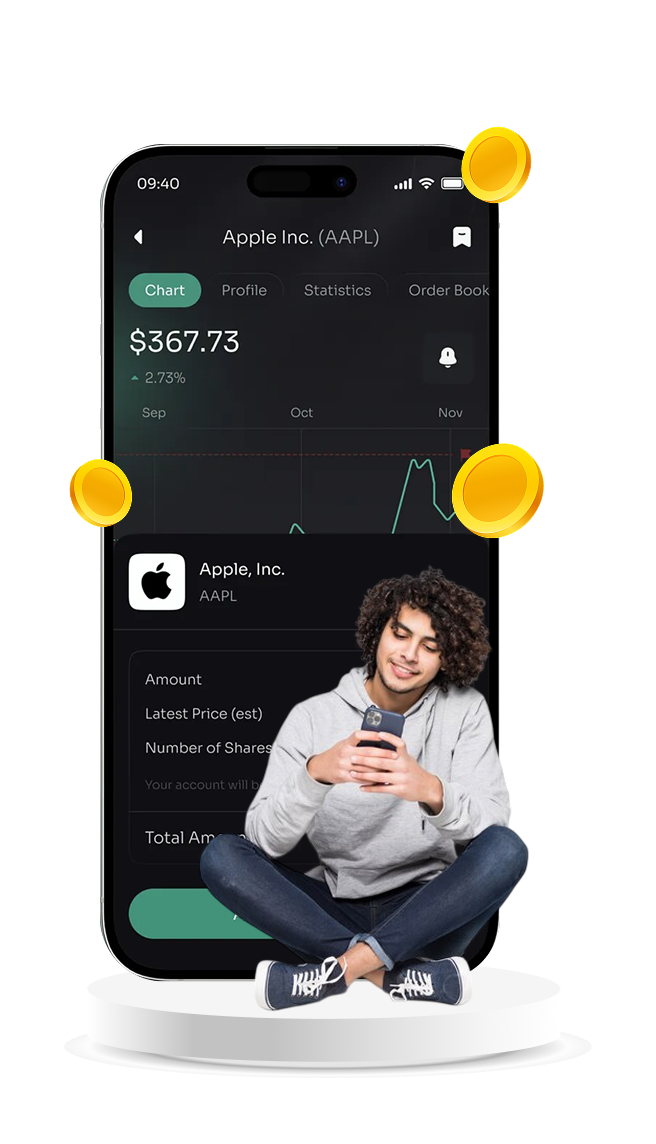 How to Build a Custom Fintech App Like Zerodha
How to Build a Custom Fintech App Like Zerodha
-
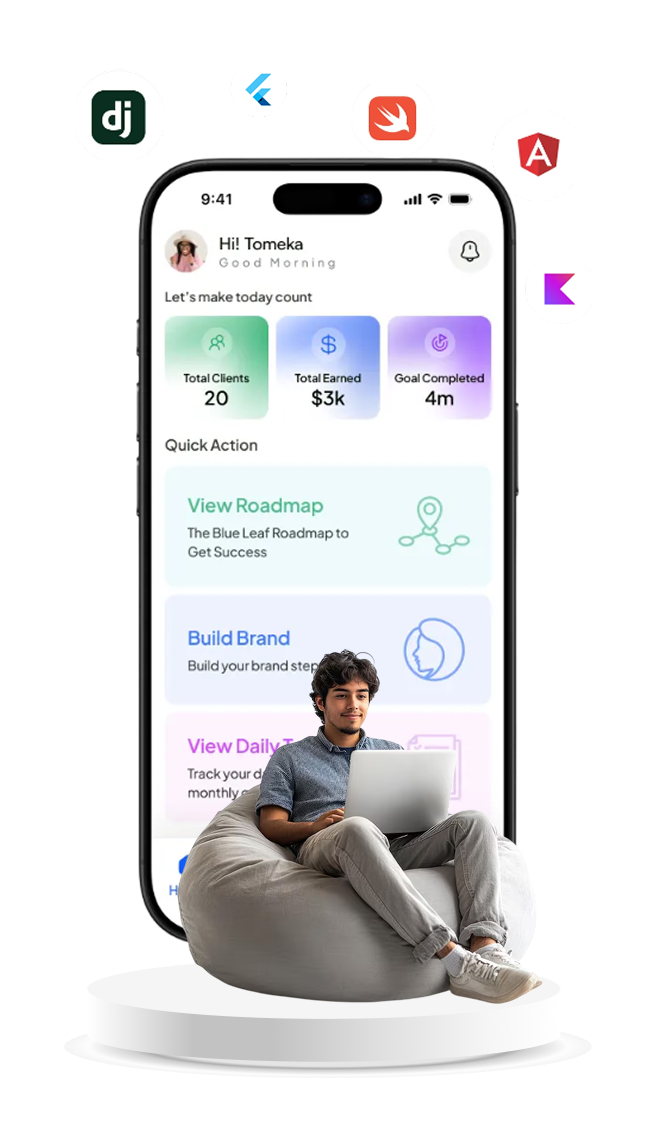 How to Start Mobile App Development in 2026
How to Start Mobile App Development in 2026
-
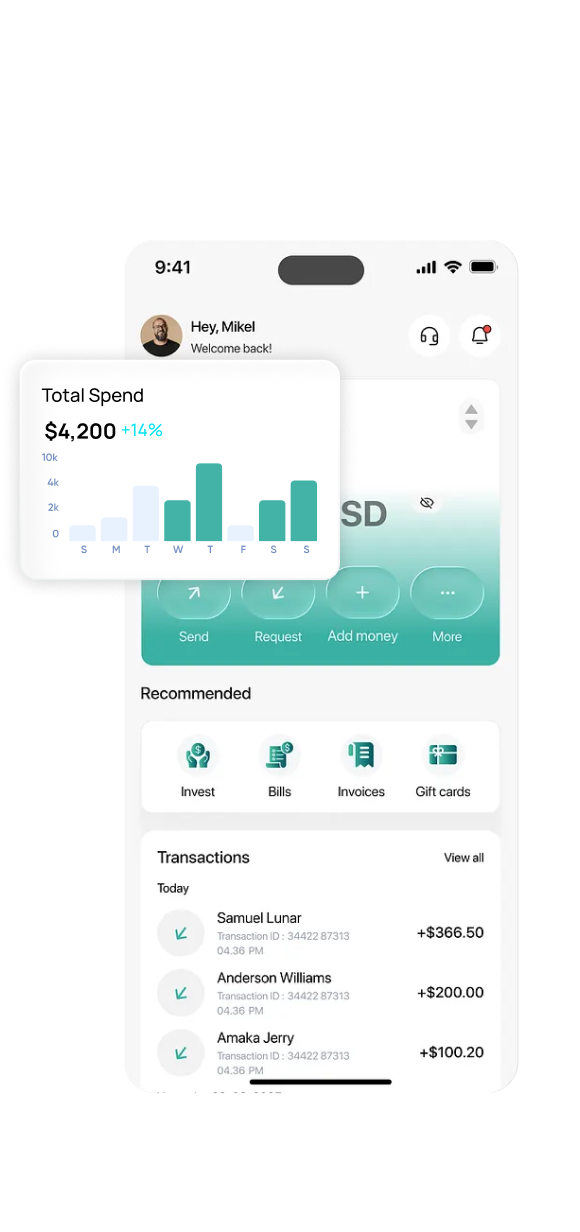 How Much Does It Cost to Develop Fintech App Like Revolut in 2026?
How Much Does It Cost to Develop Fintech App Like Revolut in 2026?
-
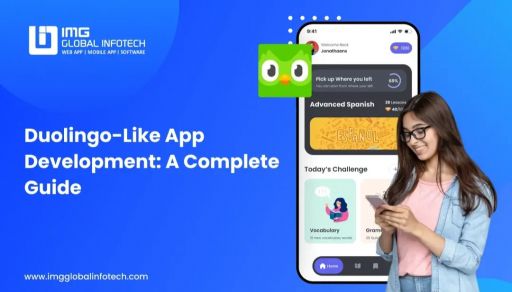 Duolingo-Like App Development: A Complete Guide
Duolingo-Like App Development: A Complete Guide
-
 How Much Does It Cost to Hire Ecommerce Web Developers in India?
How Much Does It Cost to Hire Ecommerce Web Developers in India?
Lokesh Kumar is the Digital Marketing Manager & SEO Content Strategist at IMG Global Infotech, a top-rated Web & Mobile App Development Company. With extensive experience in digital marketing, SEO, and content strategy, he specializes in boosting online visibility and driving organic growth for startups, SMEs, and global brands. Lokesh is passionate about creating SEO-friendly, user-centric content that not only ranks but also converts. His deep understanding of digital trends and search algorithms helps businesses thrive in a competitive online space.




